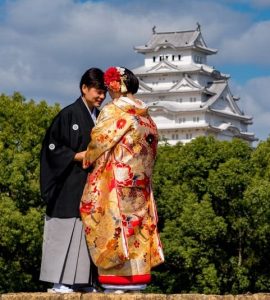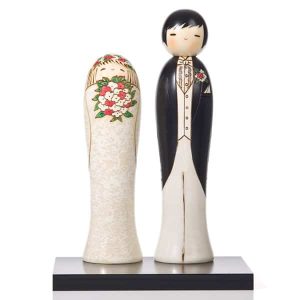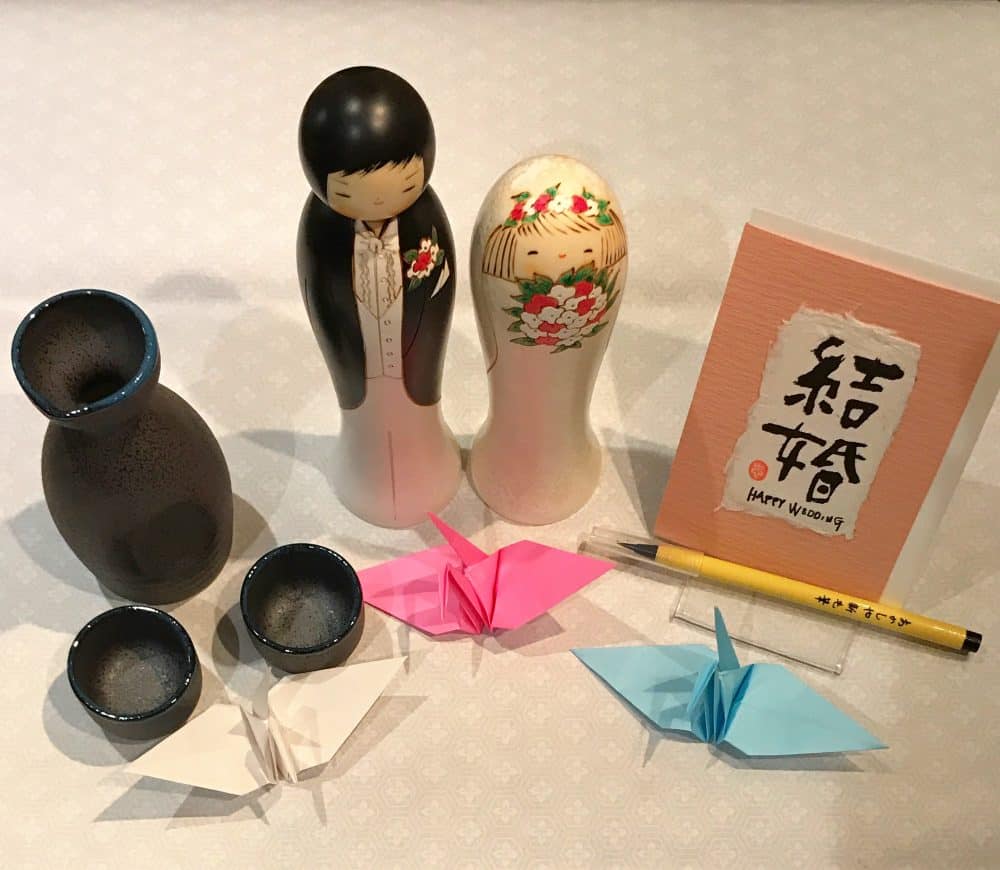With wedding season upon us, and it often being difficult to know what to expect at a Japanese wedding, we thought it best to share some Japanese wedding traditions for the uninitiated! Whether you’re attending a Japanese wedding this summer or are just curious to learn more about Japanese marriage customs, this post will give you a taste of what it’s like to experience wedding traditions in Japan.

Image courtesy of Black Camera Photography.
Traditional Japanese Marriage Customs
Japanese wedding ceremonies are traditionally held at Shinto shrines with the ceremony conducted by a Shinto priest. These are typically intimate affairs, attended by close family members of the bride and groom. Rather than rings, the couple exchanges ritual cups of sake as a symbol of their union, and branches of the sacred evergreen sakaki tree are offered to the Shinto deity. If you want to re-enact the tradition, you'll need to have some authentic Japanese saki sets to hand!

Influence from the West
Since the 1980s, more modern and western-style wedding ceremonies have crept into fashion and today, their influence is apparent in most Japanese weddings to some extent. Ceremonies are held in Christian churches and dedicated wedding chapels; although with Japan being a primarily Buddhist nation, these Christian-style weddings are more of a style statement than a religious one. The sermon is either given in Japanese, English or a combination of both, and tends not to be overtly religious. Rituals such as cake cutting, the exchange of rings and honeymoons are frequently incorporated in keeping with the western style of marriage. There are also non-religious or civil ceremonies modelled on the West, although these have no legal standing. For the time being, same-sex marriage remains illegal in Japan - although currently eight cities and city wards have legalised same-sex partnerships which offer some of the benefits of marriage.
Japanese Wedding Dress
Traditionally, the couple wore formal silk wedding kimonos, including shiromuku (a white kimono) or iro-uchikake (a coloured kimono) for the bride, and montsuki (a black kimono with the family crest) with hakama (wide-legged pants) for the groom. Japanese weddings are increasingly adopting the western style of attire, with the bride often wearing a big white dress and the groom a sharply tailored suit or tuxedo.

Japanese Wedding Parties
After the wedding, attendees are invited to the reception party along with other relatives, friends and co-workers. Again, this is fairly similar to a western celebration, involving a meal with speeches, songs and plenty to drink. You can add a bit of traditional Japanese wedding flair to your own ceremony with some beautiful origami craftwork - either make it yourself or get them pre-made!
Japanese Wedding Gifts
Rather than a gift, it is traditional to give goshugi (gift money) in a decorative envelope called a shugi bukuro. It is usually the guests who receive gifts, including tableware or their own selection from a catalogue – similar to the wedding gifts that would be given to the bride and groom in the West. Of course, if you wanted to add a personal touch to monetary donation, Japanese wedding gifts certainly wouldn't go amiss, especially for a more modern occasion!

Marriage in Japan Today
Today, influences from the West can be found in the vast majority of Japanese weddings, although traces of their Shinto heritage remain. This break from tradition is thought to stem partly from the fact that western weddings are cheaper than Shinto ceremonies, and partly from the popular perception of western culture as being modern, exotic and stylish. What the future holds for Japanese wedding traditions remains to be seen. For now, we'll leave you with this beautiful video of a traditional ceremony, the story of which can be found on The Japalian.
The Japanese Shop is home to a wide range of authentic Japanese gifts, many of them ideal for newlyweds.
